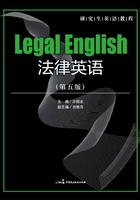
Ⅶ. Compare the legal terms in the brackets and then complete the sentences below.
1. The purpose of ________(jury charge/jury selection), sometimes called“voir dire”, is to determine the qualifications of potential members of the jury and to select an impartial jury to try the case.
2. Generally, a verdict at odds with the law will be set aside by the trial judge. However, a jury ________(conviction/acquittal)in a criminal case is not reviewable on appeal or otherwise.
3. The purpose of (direct examination/cross examination)may in some cases be to seek out information, but more often its main purpose is to undermine the credibility of the witness's (direct examination/cross examination) testimony.
4. ________(Harmless error/Reversible error)is not a ground for granting a new trial or for setting aside a verdict or for vacating, modifying or otherwise disturbing a judgment or order, unless such refusal appears to the court inconsistent with substantial justice.
5. The best way to assure that the jury does not rely on improper evidence in deciding the case is to keep it from hearing that evidence at all. The most common method for doing so in trials is to have the lawyers interpose ________(exceptions/objections)to improper evidence as it is being presented.
6. The ________(grand jury/petit jury)serves a dual function in the criminal justice system. It operates as both an accusatory body and as a shield to protect defendants from overzealous prosecutors.
7. In American federal courts, prosecution of capital offenses must proceed by ________(information/indictment). It must also be utilized with non-capital felony offenses unless the defendant waives the right. However, states are free to, and several do, prosecute crimes by (information/indictment).
8. Most criminal prosecutions are resolved by a ________(guilty plea/plea bargaining)entered prior to trial, which serves as a waiver of the right to a trial.
9. Because there is a right to have unbiased jurors, the prosecution and the defense are entitled to an unlimited number of ________(challenges for cause/peremptory challenges). In addition, each party is given a limited number of (challenges for cause/peremptory challenges).
10. Successive prosecutions by state and federal governments for criminal offenses arising out of the same criminal episode are not barred by ________(double jeopardy/dual sovereignty). These are permitted under the“ ________”(double jeopardy/dual sovereignty)doctrine.